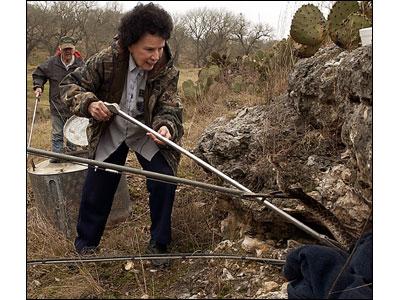February 24, 2005
Different strokes for different folks
I lived in a town where they had a rattlesnake roundup for twenty-two years, but I never liked to look at the snakes, much less hunt them.In late winter, 88-year-old Edna McDonald dons a camouflage jacket over her teddy-bear embroidered shirt, grabs her purse and her rattlesnake tongs and heads out on the hunt. January and February are snake-hunting season for McDonald. It's been that way since she started handling the creatures as a babe like some Hill Country Hercules. -- Source
But snake-hunting does appeal to some. (Read Snakedance, one of Tig's original short stories.)
Deep in the cave, a half-dozen rattlesnakes were curled up, hibernating. With the giddiness of a tomboy and a wink or two at the onlookers, she slid a long sprayer into the den while Kuzenka pumped in gasoline from a two-gallon drum to tease them out. The chemical smell wafted through the dank air.Posted by Moona at February 24, 2005 11:05 AM | TrackBackAs the snakes, one by one, slithered out of the rock, she and Kuzenka, armed with long-handled tongs, grabbed them behind their heads, lightly enough not to snap their vertebrae. The rattlers started vibrating, and soon the snake bucket — a small, tightly meshed cage — was buzzing like a forest full of cicadas.
In two weeks she will deposit the snakes into a giant pit at the Oglesby Rattlesnake Roundup, a kind of sensational, old-style carnival where, among other daredevil stunts, one couple will climb into a sleeping bag with dozens of snakes. If McDonald's snakes are among the longest, or the shortest, or the heaviest, she will win a cash prize.
Eventually she will sell the snakes, at about $3.50 a pound, to a man who markets them as a delicacy to Dallas country clubs. McDonald has tried rattlesnake only once, and she was unimpressed: "It tastes like a cross between chicken and fish."
Roundups under fire
The practice of collecting snakes with gasoline and the roundups themselves, which also are found in Kansas, Oklahoma, New Mexico, Pennsylvania, Alabama and Georgia, have been criticized by animal rights and environmentalist groups.The Humane Society claims that the number of livestock deaths from rattlesnake bites is negligible, points out that rattlesnakes control rodent populations and describes the roundups as "cruel and ecologically damaging events" that "violate the most basic principles of wildlife management and humane living."
Investigators have witnessed the shutting of snakes' mouths with wire or fishing line so they could be used as props in photos.
At least a pair of roundups in Texas have closed in the past couple of years as the number of hunters has dwindled, said Chris Hamilton, a Dallas photojournalist who is working on a book about the fading culture of the Texas rattlesnake roundups.
"These little roundups were the identities of these towns," he said. "That was their spring festival that gave people a reason to have a parade or a dance."
McDonald simply says her work saves cattle and horses from debilitating bites.
"What we do is we try to do everything to help the rancher. They're the people who grow groceries, they grow our meat," said McDonald, who was "burning up" when she was told she needed a permit to sell the snakes last year.
The state requires any person possessing more than 25 rattlesnakes for commercial sale or trade to buy an $18 nongame permit.
"I don't know what's happened to our Texas," she said."After a while you'll need to have a permit to have sex."
I enjoy snake hunting. but I prefer the gun method instead of the long handled barbeque tongs. and the question always pops into my head. Once you have ahold of a rattler... how do you let go?
Course if he'd dead, then it doesn't matter. though, I don't like touching them dead or alive, or even looking at them.
you might gather, I hate snakes. especially the long skinny kind. though, being from tennessee, I won't kill a black snake. since they like munching on rattlers and copperheads. otherwise, fire in the hole!
Posted by: Zeb Palmer at February 27, 2005 02:25 AM